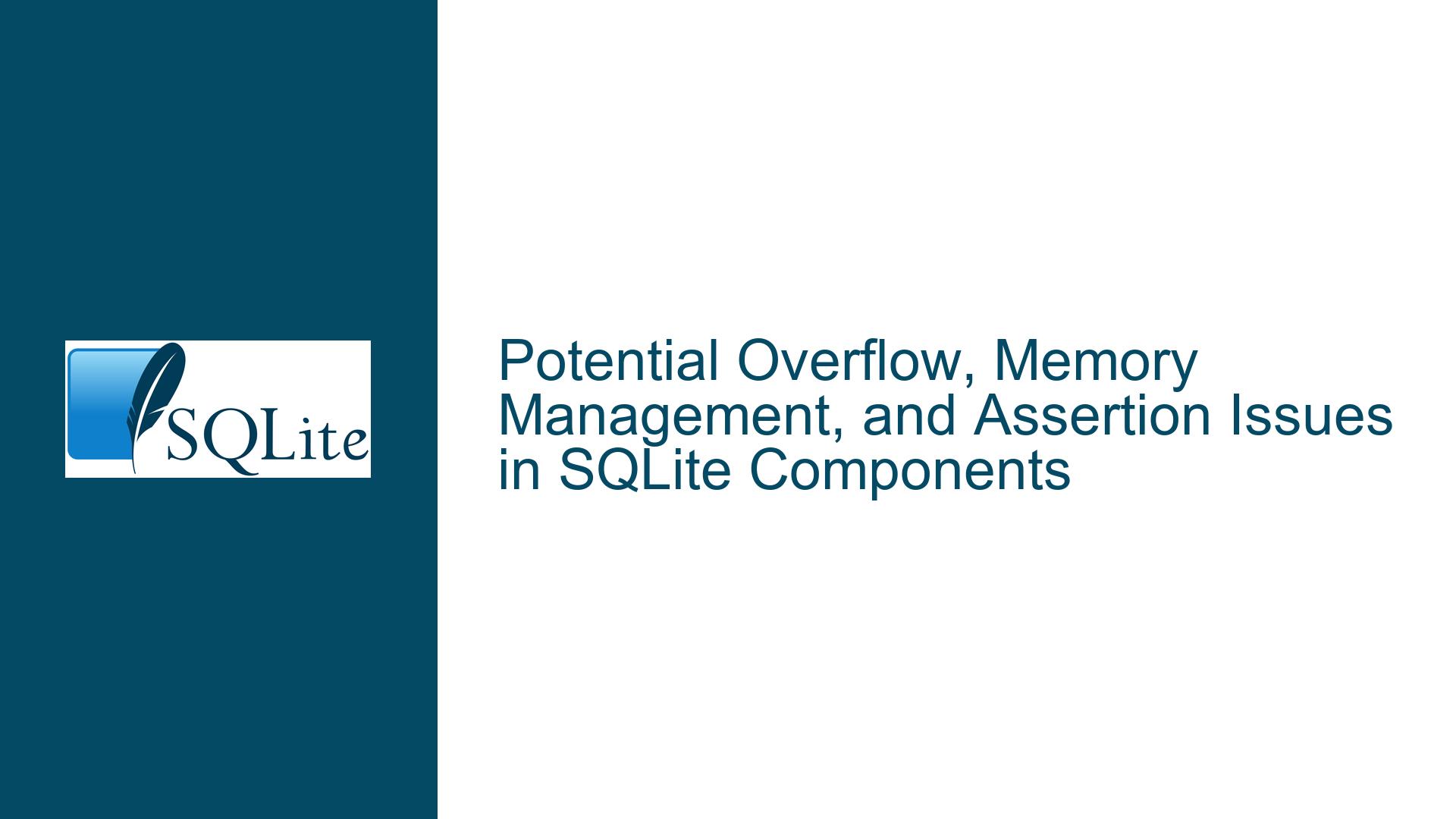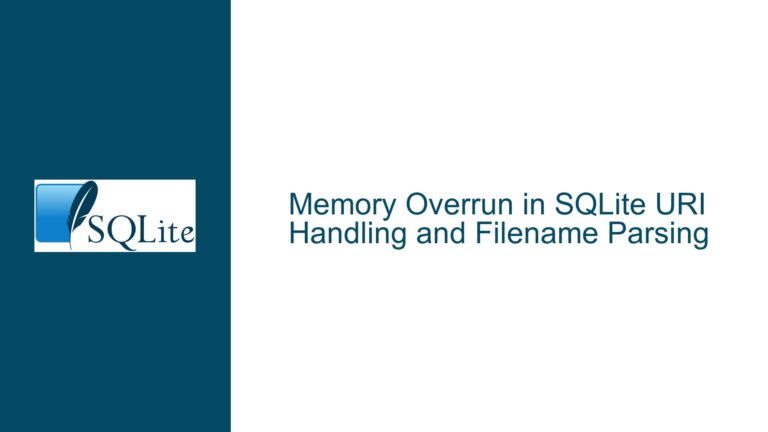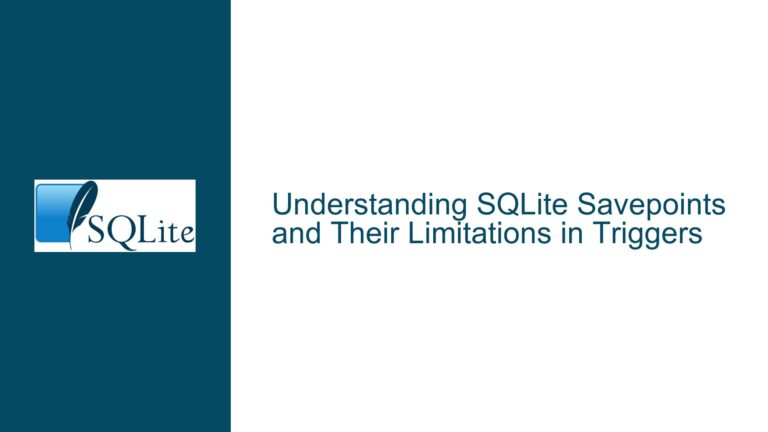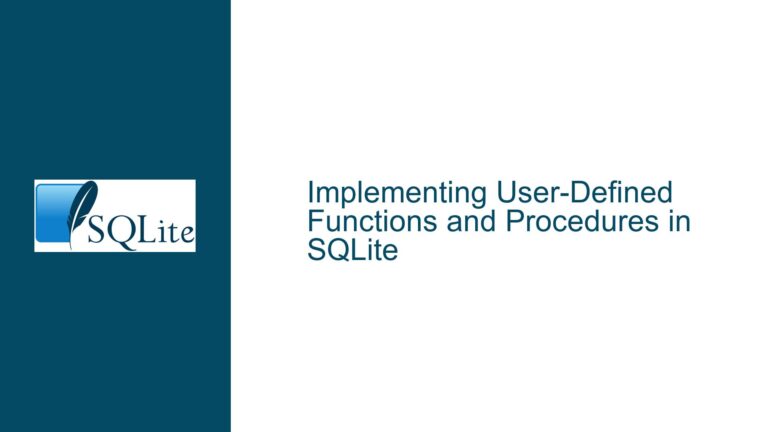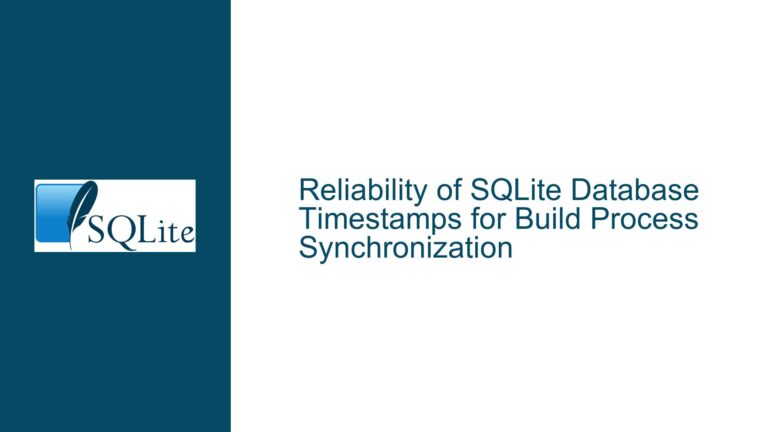Potential Overflow, Memory Management, and Assertion Issues in SQLite Components
Issue Overview: Overflow Risks, Variadic Handling, Memory Corruption, and Invalid Index Assertions
The SQLite codebase, while robust, is not immune to subtle edge cases and static analysis findings. This guide addresses four distinct issues identified in components related to Full-Text Search (FTS3/FTS5), variadic argument handling, and assertion logic:
Potential Integer Overflow in FTS3 Snippet Calculation
Inext/fts3/fts3_snippet.c, a calculation involvingiStart = iEnd - pIter->nSnippet + 1(line 401) raised concerns about integer overflow ifpIter->nSnippetis negative. This variable is clamped between -64 and +64 elsewhere, but static analysis flagged scenarios where negative values might propagate.Missing
va_endCall in Error Handling Path
Inext/recover/sqlite3recover.c, ava_endmacro was not invoked before returning from a function when a format string (zFmt) wasNULL. This violates C standards, asva_endmust always pair withva_startto avoid undefined behavior.Double Free and Use-After-Free in FTS5 Expression Parsing
The FTS5 module’sext/fts5/fts5_expr.cexhibited a scenario wheresqlite3Fts5ParseNodeFree()could access or free memory already released byfts5ExprAddChildren(). This occurs under specific conditions where expression depth limits are exceeded after nodes are merged and freed prematurely.Incorrect Assertion for Array Index Validation
Inext/expert/sqlite3expert.c, anassert(iSlot <= p->nSlot)(line 1517) failed to check for negativeiSlotvalues. Additionally, the assertion’s upper bound was incorrect:iSlotshould be less thanp->nSlot, not less than or equal.
Possible Causes: Data Flow Ambiguities, Control Flow Gaps, and Ownership Miscommunication
1. Integer Overflow in FTS3 Snippet Logic
- Misinterpretation of
nSnippetConstraints: WhilepIter->nSnippetis clamped to a range of -64 to +64, the actual value used in calculations is adjusted to be non-negative in an earlier code path (e.g., vianFToken = abs(pIter->nSnippet)). Static analysis tools may not track this implicit guarantee, leading to false positives. - External Data Influence:
iEnd(derived frompPhrase->iHead) could theoretically introduce values that exacerbate overflow risks if not properly sanitized.
2. va_end Omission in Error Paths
- Conditional
va_startWithout Unconditionalva_end: The original code placedva_startinside anif (zFmt)block but only calledva_endwithin the same block. IfzFmtisNULL,va_startis skipped, butva_endis still required ifva_startwas executed.
3. Memory Ownership Conflicts in FTS5 Expression Nodes
- Dual Memory Management Strategies:
fts5ExprAddChildren()uses two approaches:- Pointer Assignment: Transfers ownership of
pSubto the parent node without freeing it. - Memory Copying and Freeing: Copies child nodes from
pSuband then freespSub, assuming the parent now owns the copied data.
- Pointer Assignment: Transfers ownership of
- Depth Check Timing: If expression depth validation (
SQLITE_FTS5_MAX_EXPR_DEPTH) fails afterfts5ExprAddChildren()freespSub, subsequent cleanup insqlite3Fts5ParseNodeFree()attempts to freepSubagain or access its children, leading to crashes.
4. Assertion Logic Gaps in Slot Index Validation
- Incomplete Range Checks: The assertion
iSlot <= p->nSlotassumesiSlotis non-negative and that slots are zero-indexed. However,iSlotcould be negative if derived from untrusted input, andp->nSlotrepresents the count of slots (indices 0 tonSlot-1).
Troubleshooting Steps, Solutions & Fixes: Code Adjustments and Ownership Clarification
1. Resolving FTS3 Integer Overflow Risk
- Code Review Confirmation: Verify that
pIter->nSnippetis non-negative at the point of use. Infts3SnippetText(),nFToken(derived frompIter->nSnippet) is explicitly set to its absolute value, ensuring non-negative values. - Add Assertion for Clarity: Insert
assert(pIter->nSnippet >= 0);before line 401 to enforce the invariant. - Mitigate External Data Risks: Ensure
pPhrase->iHeadis validated upstream to prevent extreme values that could cause overflow even with non-negativenSnippet.
2. Correcting va_end Placement in Recovery Module
- Move
va_endOutside Conditional: Ensureva_endis called unconditionally afterva_start, regardless ofzFmt’s validity:if( zFmt ){ va_start(ap, zFmt); // ... format message ... va_end(ap); } // Ensure va_end is called even if zFmt is NULL - Refactor Error Handling: Centralize
va_endcalls in a cleanup block to avoid redundancy.
3. Fixing FTS5 Memory Corruption
- Modify
fts5ExprAddChildren()Ownership Semantics:- Return Ownership Status: Change the function’s return type to
intto indicate whetherpSubwas copied and freed (1) or merely assigned (0). - Defer Freeing to Caller: Remove
sqlite3_free(pSub)fromfts5ExprAddChildren(). Instead, let the caller (sqlite3Fts5ParseNode()) freepSubonly if ownership was transferred.
- Return Ownership Status: Change the function’s return type to
- Updated Code Snippet:
static int fts5ExprAddChildren(Fts5ExprNode *p, Fts5ExprNode *pSub) { int ownershipTransferred = 0; if( p->eType != FTS5_NOT && pSub->eType == p->eType ) { // Copy children and free pSub ownershipTransferred = 1; } else { // Assign pSub as a child } return ownershipTransferred; } - Caller-Side Freeing: In
sqlite3Fts5ParseNode(), check the return value offts5ExprAddChildren()and freepSubonly if ownership was transferred:int transferredLeft = fts5ExprAddChildren(pRet, pLeft); int transferredRight = fts5ExprAddChildren(pRet, pRight); if( pRet->iHeight > SQLITE_FTS5_MAX_EXPR_DEPTH ) { // Error handling } else { if( transferredLeft ) sqlite3_free(pLeft); if( transferredRight ) sqlite3_free(pRight); }
4. Correcting Slot Index Assertions
- Adjust Assertion Bounds: Replace
assert(iSlot <= p->nSlot)withassert(iSlot >= 0 && iSlot < p->nSlot). - Audit Callers for
iSlotValidity: Ensure all callers ofexpertHandleSQL()validateiSlotagainstp->nSlotbefore invocation. - Documentation Update: Clarify in comments that
iSlotis a zero-based index and must be within[0, nSlot-1].
General Recommendations for Static Analysis
- Annotate Invariants: Use
assert()or comments to document assumptions (e.g.,nSnippet >= 0). - Leverage Compiler Warnings: Enable flags like
-Wsign-conversionto catch implicit signed/unsigned mismatches. - Fuzz Testing: Integrate FTS3/FTS5 modules into fuzzing pipelines to uncover edge cases not covered by unit tests.
By addressing these issues through targeted code adjustments and ownership semantics clarification, SQLite’s robustness against edge cases and static analysis findings is significantly enhanced.
